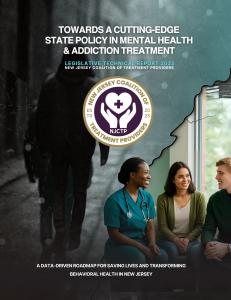New Jersey Poised for a Paradigm Shift in Mental Health and Addiction Policy, Coalition Report Finds
Coalition urges bold reforms to expand care, enforce parity, and make NJ a national leader in mental health and addiction treatment.
JERSEY CITY, NJ, UNITED STATES, September 12, 2025 /EINPresswire.com/ -- In a sweeping new legislative report, the New Jersey Coalition of Treatment Providers (NJCTP) has laid out what it calls a “historic opportunity” for New Jersey to redefine its approach to mental health and addiction treatment. The 2025 Legislative Technical Report, “Towards a Cutting-Edge State Policy in Mental Health and Addiction Treatment,” argues that the state must confront rising rates of mental illness, overdoses, and systemic inequities with reforms as ambitious as they are urgent.The report, a product of months of comparative legal research and policy analysis, positions New Jersey at a crossroads: either continue with piecemeal responses or embrace comprehensive legislation that enforces insurance parity, expands crisis care, and regulates the treatment sector with unprecedented rigor.
The findings are stark. Nearly 28 percent of New Jersey adults report symptoms of anxiety or depression, and in 2023 alone, the state recorded 2,816 unintentional overdose deaths. Meanwhile, access to treatment remains scarce: only one in four outpatient mental health facilities was accepting new patients as of 2022. These figures, the report warns, represent not only a health emergency but also a moral crisis.
Lessons from Other States
The coalition’s proposals draw heavily on models that have yielded measurable results elsewhere. North Carolina’s statewide telepsychiatry initiative has reduced costs and waiting times. California’s dedicated “millionaire’s tax” has secured stable funding for community mental health programs. New York’s Daniel’s Law has redirected mental health crisis calls from police departments to trained clinicians. And states such as Texas and Indiana have cautiously opened the door to research on emerging therapies, including psilocybin and ibogaine.
Among its most consequential recommendations, the NJCTP calls for:
Independent audits to enforce insurance parity.
A permanent State Mental Health Fund, modeled on California’s tax-based financing.
Expansion of 24/7 telepsychiatry in emergency departments.
Non-coercive crisis interventions, prioritizing clinicians over law enforcement.
Strict regulation to outlaw body brokering and deceptive marketing practices.
State-supported research into innovative, evidence-based therapies.
A Call for Leadership
“The time to act is now,” said Daniel Regan, President of NJCTP. “New Jersey has the infrastructure, the provider networks, and the expertise to lead the nation in behavioral health innovation. What remains is the political will to enact reforms that are transparent, sustainable, and profoundly human.”
The report insists that its proposals are not aspirational manifestos but practical, data-driven steps that could save lives and reduce the long-term social and economic costs of untreated illness. “This is not a distant vision,” the executive summary concludes. “This is an urgent roadmap.”
If lawmakers heed its call, New Jersey could become a national benchmark for ethical, effective, and equitable mental health and addiction treatment in the twenty-first century.
Peter Neu
News NJ
email us here
Legal Disclaimer:
EIN Presswire provides this news content "as is" without warranty of any kind. We do not accept any responsibility or liability for the accuracy, content, images, videos, licenses, completeness, legality, or reliability of the information contained in this article. If you have any complaints or copyright issues related to this article, kindly contact the author above.

